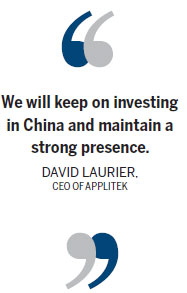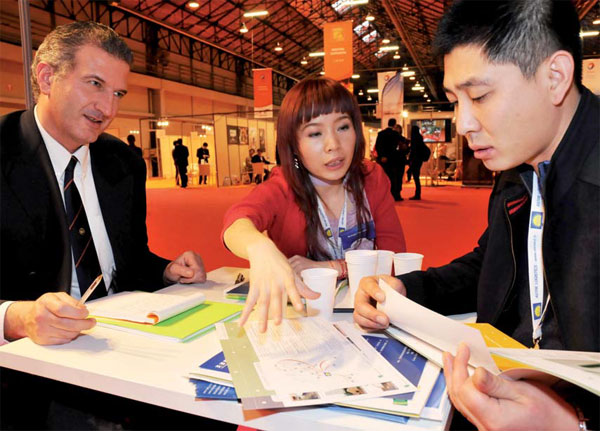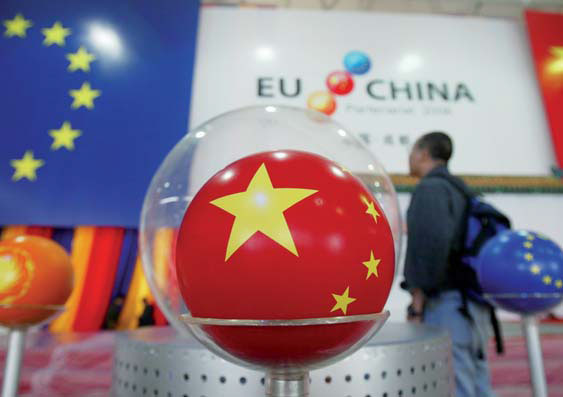Down but not out

European business leaders upbeat about Chinese economy
Though European business leaders and experts hold different views on China's recent twists in the stock market and its currency depreciation, they are upbeat about the country's growth outlook, saying that it will still contribute to the global economy.
"In the short run, it is likely that the pains of economic transition will continue to be felt. This will likely mean slower growth. But, depending on policy decisions, it could mean better and more sustainable growth for the future," says Markus Beyrer, director-general of Business Europe, which is based in Brussels and is a network of leading European companies.
| Chinese investors at a China-EU investment fair in France. Provided to China Daily |
| A China-EU trade and investment expo in Chengdu beckoned people to visit. Provided to China Daily |
Though Beyrer is still confident about China's economic outlook, he says the recent economic upheaval has shown that the economic model of export-led growth is no longer sufficient to generate long-term growth in China.
"The current leadership tacitly acknowledged this when announcing its reform plans in late 2012. China should commit to deeper reform in order to move toward consumption and investment-led growth and in order to retain the confidence of European business in China as a market with valuable business opportunities," says Beyrer. "The recent economic developments only serve to underline the importance of speeding up reform."
While China is experiencing a period of economic slowdown, Beyrer says it is still an interesting place for European companies to do business but that growth figures alone are not enough to attract and maintain European business and investment.
Steven Verhasselt, director of Liege Airport's Asia representative office, says the shocks of the market are short-term movements, while the long-term direction is still upward. In a way, he says, it makes sense that the market is unable to continue generating 10 percent annual growth rates, as the challenge to hit 10 percent becomes bigger every year.
"The growth rate of 6 or 7 percent is still among the highest of industrialized countries, and domestic consumption is growing. I am confident in the Chinese economy and the Chinese investment climate," says Verhasselt.
For Europe, Verhasselt says China is now also becoming an export market.
"From the airport's point of view, the loads to and from China are now balanced in Liege, while that was completely different only five years ago," says Verhasselt.
He says at that time, cargo flights arrived full from China, but departed with very low payloads or even empty. That is changing as the demand in China rises for European products.
"Europeans should work a lot harder to adapt to the requirements of the Chinese market, so the trade balance between China and Europe can equalize slowly but steadily," he says.
In the near future, Verhasselt says there will be some difficulties in adapting to the new reality of single digit annual growth, which will have an impact on the trade balance, the yuan and the stock market.
"In the long term, I believe that any growth rate above 5 percent is enough to keep China in the driving seat of the global economy," he says.
"Planes will depart in China full, freighters with products and passenger planes with outbound tourists. We are happy to receive them in Liege."

Zhang Haiyan, director of Neoma's Confucius Business Institute, says: "Yet, there are true worries in China, but I don't think we need to be panicked; compared to industrial or other emerging countries, China is still performing quite well."
China's achievements in past decades, especially the tangible and intangible resources and assets that it has accumulated over the years, provides a solid base for its future development, says Zhang.
Existing manufacturing facilities, efficiency in large scale production, relatively good communication and transportation infrastructure, potential market size, growing middle class, engagement of multinational companies, dynamic entrepreneurial businesses, which he calls China "factors", have not vanished.
Zhang says the bad news from China and its impact on Europe might be rather short term and psychological and looking at the global scale, companies in the European Union still consider China as their top destination in their investment decisions and they continue to strengthen their market position in the Chinese market.
David Laurier, CEO of AppliTek, an environmental application company in Belgium, says China still has a good growth rate, despite the plunges in the stock market and foreign exchanges.
"I am confident about this market because there is a huge need to improve environmental conditions for the people," says Laurier.
"We European businesses have to react to the new challenges in the market."
China's economy will be slowing down further in the coming six months but it will pick up after that, he says.
"We will keep on investing in China and maintain a strong presence."
Niels Christiansen, CEO of Danfoss Group Global in Denmark, which produces machinery and services, says China is in the process of changing its society and that the Chinese economy has entered a new phase that is different from the high-speed growth pattern exhibited in the past. It has a new trend that features more sustainable, mid-speed growth with higher efficiency and lower costs.
As to the recent economic turmoil, Christiansen says: "We have a strong and very well-established business in China and, as everybody else, we of course follow the development closely. We are active in many different business areas and sell our products to many different customers in many different sectors."
As for the depreciation of the yuan, Christiansen says his company's cash flow exposure against the yuan is neutral as it has a good balance of imports and exports, which means the depreciation does not have a direct effect on them. "We hope that it can help strengthen Chinese competitiveness and this way stimulate the Chinese economy. Stronger Chinese growth is also positive for Danfoss," says Christiansen.
Zhang Haiyan says such a rapid and important depreciation of the yuan was not expected, which could have some short and long-term impact on the economic relationship between China and the rest of the world.
"With regards to the EU-China FDI and trade relations, the depreciation of RMB might negatively affect European exports to China and inbound tourist flows from China to Europe," says Zhang.
"It could also increase the costs for Chinese companies to invest in Europe."
Verhasselt, from Liege Airport, says he takes a long-term view of the stock market, not a day-trader view, and that the Chinese market remains interesting.
"Of course it needs some regulations. All investors, corporate and individual, should respect the stock exchange for what it is, a financial institution and trading platform, not a casino," he says.
Christiansen of Danfoss says the Chinese stock market is quite volatile and this trend will probably continue. "However, it is not something that affects our business directly," he says.
Zhang Haiyan says China's stock exchange has rarely reflected the health of the Chinese economy since its establishment.
"The recent ups and downs are more linked with the speculations and opportunistic behavior of investors. Yet, the plunge of the stock exchange could create panic for many small and individual investors who often belong to the middle and emerging class," says Zhang.
"The loss of money and especially the loss of confidence might in the short term reduce the consumption of this group of consumers, especially for durable and luxury goods."
Contact the writers through fujing@chinadaily.com.cn
(China Daily European Weekly 09/11/2015 page20)
Today's Top News
- Japan tempting fate if it interferes in the situation of Taiwan Strait
- Stable trade ties benefit China, US
- Experts advocate increasing scope of BRI to include soft power sectors
- New engine powers cargo drone expansion
- China to boost green industry cooperation
- Manufacturing PMI rises in November
































